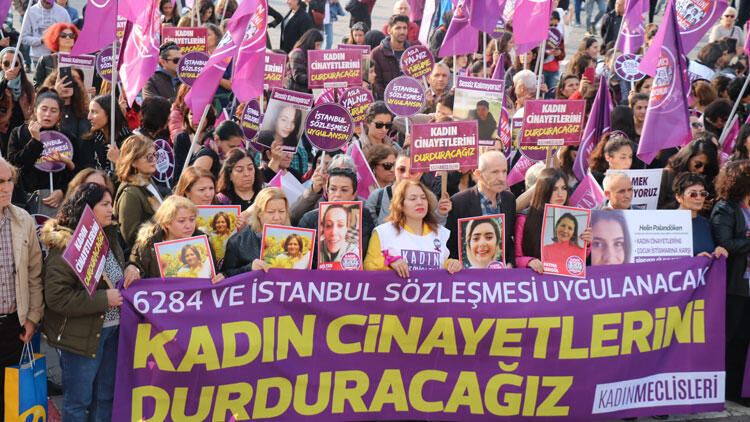
In 2020 there was an increase in discussions about the possible withdrawal of Turkey from the Istanbul Convention, which only occurred at the beginning of 2021. This human rights agreement was made by the European Council in 2011 to combat and prevent violence against women and domestic violence based on government measures based on prevention, protection, criminal procedure and policy alignment between signatories. The decision revolted the country's women, once, according to the Turkish feminist group “We will end femicide”, only in march, 47 women were killed in turkey.
The current president of Turkey, Recep Tayyip Erdogan, signed the treaty in 2011 while he was prime minister of the country, Yet, on March 20, 2021, Erdoğan announced Turkey's withdrawal from the Istanbul Convention by stating that “(the convention was) sabotaged by a group in an attempt to normalize homosexuality". This demonstrates the president's consent to political pressures from conservative groups, that value family principles considered traditional. Two days after this declaration, six women were killed in the country within twelve hours.
In response to the president's decision, Turkish women protest against misogyny in the country. In addition to demonstrations, the feminists appealed to the European Council and filed legal proceedings so that the exit could be annulled. In addition, on april 6th, in Erdoğan's meeting with Charles Michel, President of the Council of the European Union, e com Ursula Von der Leyen, President of the EU Commission, the Turkish president's sexist stance was highlighted by humiliating von der Leyen. This because, when entering the meeting place, there were only two armchairs, which were quickly occupied by Erdoğan and Michel, which embarrassed the EU head, which was relegated to a distant sofa, despite your position, and displeased the European bloc.
In this way, Turkey's withdrawal from the Istanbul Convention of the European Council brings political clash, both external and internal. Internationally, Turkey risks its relationship with the European Union, since the meeting marked by the gender issue had as its objective a greater alignment between both. However, facing the embarrassment that occurred, new incidents may lead to political retaliations. Nationwide, the decision is considered a violation of human rights, which can result in an increase in femicide and other violence and represents a setback in the achievement of women's rights.
Bibliographic references
2021 March Report of We Will End Femicide Platform. We Will Stop Femicide, 07 Apr. 2021. Available in <http://kadincinayetlerinidurduracagiz.net/veriler/2960/2021-march-report-of-we-will-end-femicide-platform>. Access in 11 Apr. 2021.
EU head snubbed in meeting with Turkish president. DW Brazil, 7 Apr. 2021. Available in <https://p.dw.com/p/3rhBF>. Access in 11 Apr. 2021.
Turkey abandons treaty aimed at curbing violence against women. DW Brazil, 20 mar. 2021. Available in: <https://www.dw.com/pt-br/turquia-abandona-tratado-que-visa-coibir-viol%C3%AAncia-contra-mulheres/a-56940965>. Access in 11 Apr. 2021.
Council of Europe Convention on preventing and combating violence against women and domestic violence. European Council. Available in: <https://rm.coe.int/1680685fcb>. Access in 11 Apr. 2021.
European countries must all ratify the Istanbul Convention on Combating Violence Against Women Globally. Amnesty International, 1 ago. 2014. Available in: <https://www.amnistia.pt/paises-europeus-tem-todos-de-ratificar-a-convencao-de-istambul-no-combate-global-a-violencia-contra-as-mulheres/#:~:text=O%20grupo%20dos%20pa%C3%ADses%20signat%C3%A1rios,%2C%20S%C3%A9rvia%2C%20Su%C3%A9cia%20e%20Turquia>. Access in 11 Apr. 2021.
CHOUKROUNE, Leila. GULEL, take over. Turkey: Erdoğan’s decision to pull out of Istanbul Convention has put him in opposition to women. The Conversation, 24 mar. 2021. Available in: <https://theconversation.com/turkey-erdogans-decision-to-pull-out-of-istanbul-convention-has-put-him-in-opposition-to-women-157753> . Access in 11 Apr. 2021.
YALCINALP, Esra. Turkey Erdogan: women rise up over withdrawal from Istanbul Convention. BBC Turkish, 26 mar. 2021. Available in <https://www.bbc.com/news/world-europe-56516462>. Access in 11 Apr. 2021.
Turkey abandons treaty aimed at curbing violence against women. DW, 20 mar. 2021. Available in <https://p.dw.com/p/3quwf>. Access in 11 Apr. 2021.
SILVA, Isabel Marques da; COARSE, Stefan. "State of the Union": the EU-Turkey relationship after the “sofagate”. EuroNews, 9 Apr. 2021. Available in <https://pt.euronews.com/2021/04/09/estado-da-uniao-a-relacao-ue-turquia-apos-o-sofagate>. Access in 11 Apr. 2021.
Authors: Isabela Paez Halak and Natália Yuri Kitayama, NENE/ESPM researchers
